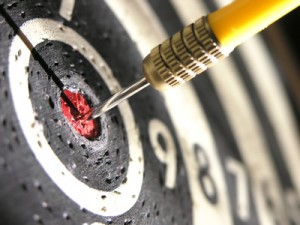
You may have heard at some point in your life that you need to set your goals low so that you build confidence. The idea is to set your expectations low so that you won’t be too disappointed if you fail. With that attitude, it’s not “if” but “when” you’ll fail…
I call these “lame goals” because you are already cutting yourself off at the knees by setting your sights low.
Of course, you usually don’t say to yourself that you are “setting your sights low”. What you say to yourself is that you want to keep your goals “realistic”. Aarrggghhh! This infuriates me! That’s another reason I say to skip the R (and the S and the A) in SMART goal setting and just focus on the M and the T.
While having some easy goals can help you build momentum, easy goals are really only useful as supporting goals. By that, I mean there are major goals and minor goals. Major goals have many supporting goals (minor goals) that are required along the path. I’ll write more about major/minor goals in another article but here’s an example:
A major goal could be “To have enough assets by 2015 that my passive income is enough to support all my basic living expenses.” Then many minor “supporting goals” follow, for example “Purchase a small rental property by August 15, 2010 that is immediately cash-flow positive and that requires less than a $20k down payment.” Or, as a really easy one, “Read 3 books on real estate investing by July 1.” As I’ll write in a few weeks, confusing your minor goals for major goals can cause major problems and limit your success.
Why Easy Goals Backfire
The problem with setting easy goals is that they easily slip into what I call the self-esteem trap – the idea of feeding your self esteem without actually accomplishing anything worth being proud of.
Setting goals that are too low or too easy undermine your true confidence. On the surface, you feel good because you “accomplished” that (lame) goal. But subconsciously, your heart and mind know you are just coasting and (again, subconsciously) you start to believe that you are incapable of achieving anything ambitious.
A Real-World Example That Hurts Individuals And Society
One real-world example area I am increasingly alarmed about that fits this description is obesity.
There are a growing number of fat people (pun intended) who are promoting the idea that being fat is ok. Actually, more than ok. It’s to be celebrated.
These are almost always people who have tried to lose fat, several times, and have given up. They believe they simply can’t do it. It’s just a belief, but they view it as fact.
Having failed at the true goal, they set a new (lame) goal of “well, I guess I’m just built this way, but I probably shouldn’t get fatter”. So their new goal: “Don’t get fatter.”
Let’s say they successfully “don’t get fatter”. Well, they accomplished their goal. Sure, they are 300 pounds with no muscle, but hey – at least they can be proud of accomplishing their goal of not getting fatter!
In an effort to save their self-esteem, they convince themselves that fatness is ok, even good. But that’s all external show. Inside, they know they have failed. And their self-confidence is cut.
Let’s get this straight- it is not ok to be fat. It’s unhealthy and it’s selfish. That’s an internal and an external expectation there for those of you keeping track…
But what worries me most is that they have the potential to change society’s view on obesity. If kids start hearing from an early age that it’s ok to be fat. And if kids “learn” that, then they’ll grow up without any inner sense that they need to be other than fat. So it may never occur to them to have a goal related to fitness that is any more challenging that being fit enough to walk from the couch to the fridge.
Ok, let me step off the soap box and wrap up this article…
Set Non-Lame Goals
Why not set ambitious goals? What are you afraid of?

